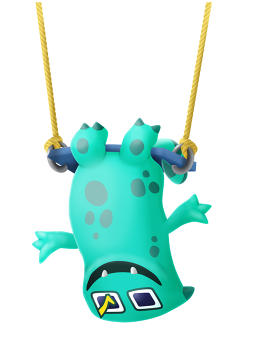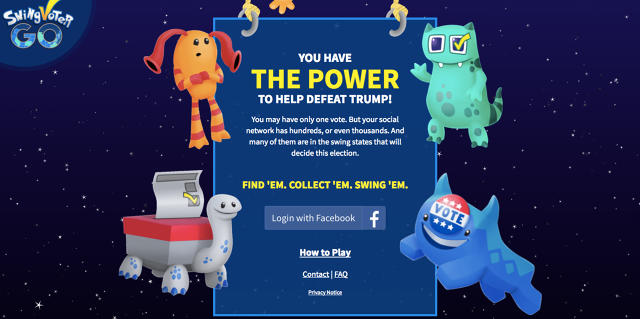If you’re passionate about defeating Donald Trump next month—and you live in a state with a predetermined outcome like California or New York—you may feel disenfranchised by an election process in which only about 12 states actually have electoral votes that are up for grabs.
That’s why the left-leaning political action nonprofit MoveOn.org and the well-known game designer Jane McGonigal have teamed up on Swing Voter Go, an election game launching today that’s clearly inspired by Pokemon Go and meant to help people in uncontested states feel like they can still make a difference in the election’s outcome.
In past elections, MoveOn has come up with numerous campaigns meant to empower people in safe states. This year, based on the burning desire of its membership to keep Trump out of the White House, the organization wanted to develop something that split the difference between traditional “clicktivism” and the hard ask of traveling to swing states, says Ilya Sheyman, MoveOn’s executive director.
“How do you empower millions of MoveOn members who don’t live in swing states” to impact the election? Sheyman asks. “One of our realizations is that in the social networks of all these people, there are all these swing-state voters that people know. If you ask them, ‘Do you know someone who’s considering voting for Trump, staying home [because they’re] disenchanted, or considering voting 3rd party?’ They say ‘Yes, my cousin, or uncle, etc.'”

As scary as it sounds, studies have shown that 62% of Americans rely on social media for their news, a number that’s even higher among millennials, Sheyman explains. At the same time, Facebook determined that if users see that someone in their feed they know personally is voting, they themselves are six times more likely to vote.
That led to the conclusion that social networks would be a great place for people in safe states to reach out to friends or family members in swing states and try to persuade them to vote—specifically, to cast a ballot for Hillary Clinton, who at this point is the only candidate with a legitimate chance to beat Trump.
The trick was coming up with a game that could help people figure out who in their social graph was in a swing state, and then determine how to help them start an “authentic” discussion with their friends or loved ones about voting for Clinton.
As Sheyman explains, if you make the process of canvassing something like a video game, or have similar elements, you can possibly increase the number of people who participate in the process.
Gaming: More Common Than Voting
One of McGonigal’s key insights was that 155 million Americans play video games, more even than the number of people who vote. That made MoveOn feel like there was something to tap into.
McGonigal, a researcher at the Institute for the Future and the author of two best-selling books on the positive impact of games on society, told me that the key to the game is fact that most people in uncontested states have friends or family in swing states—and they may not even realize it.
That’s why the first thing players see when they log in will be a map highlighting swing states. Tap on one of those states and the game opens a window listing all your Facebook friends who live there.
Swing Voter Go isn’t the kind of social game people are used to, McGonigal says. There are no points, no leveling up, and no achievement badges, though players do report when they’ve successfully changed someone’s mind.
“The game mechanic is to swing a vote,” she says. “Something magical happens in your personal profile section [when they succeed]. Your score goes up, and we’re keeping score.”

Based On A Popular Game
Although she wouldn’t be specific in advance, Swing Voter Go uses game metaphors and language that will be familiar to many people.
“There’s a specific game that we are referencing,” she said cryptically. “It will be very obvious when someone comes to the site what our references are.”
Clearly, that game is Pokemon Go.
McGonigal is quick to note that MoveOn is being very careful about privacy—it’s not importing any data about users’ friends. Rather, Swing Voter Go simply gives players a way to search for their friends and family in swing states, and then set out on their mission.
That mission, of course, is to try to persuade their friend or loved one to vote for Hillary. To do so, McGonigal tells me, the game provides numerous non-confrontational suggestions on how to approach potential voters, suggestions that have been proven to effectively persuade without putting people off.
More to the point, the techniques include memes, talking points, and conversation-starters that have been shown to be most effective in getting people to vote for Clinton. And when it works, the game is built to help the community of players learn from each other’s successes.
“We’ve got a repository of these techniques that you can try,” she says. “Every time you try one, we ask you to report back, and if it works, we’re collecting intelligence” on what works.
Although the game mainly is geared around connecting players to their friends and family on Facebook, it also provides tools for using other social networks, like Twitter, Snapchat, and LinkedIn, to get the conversations started.
Over many elections, MoveOn has honed the techniques it provides its members for going door-to-door to canvas. But those are built around trying to persuade strangers, and when she was designing Swing Voter Go, McGonigal knew that players would be having different kinds of conversations about voting for Clinton since they would be talking to people with whom they already have relationships.
“The way you talk to a stranger is different than if you know someone and you know something about them,” she says. “If it’s somebody who has granddaughters, you can talk to them about what it might mean to have the first woman president. It’s really designed for a more personal style of conversation, more connected to values, and helping people be heard. I think you can do that more effectively with people you know, because a deeper conversation is more likely.”
537 Votes
MoveOn isn’t trying to delude its members into thinking they can convince millions of people to change their votes. But knowing that, for example, George W. Bush won Florida—and thus, the presidency—by just 537 votes in 2000, the organization said even small changes can make a difference. It hopes that a minimum of 10,000 people will reach out to at least two friends or family members. Even that, Sheyman says, might generate enough new Clinton voters to help the former Secretary of State win one or more swing states that she might have otherwise lost.
“Is this going to win the election? I don’t know,” says Sheyman. “When elections are extraordinarily close, these kinds of conversations with voters in swing states” can make a difference.
“Secret Headquarters”
Once someone signs up for Swing Voter Go, they will have access to what McGonigal calls a “secret headquarters” where people can discuss the techniques they tried, what worked, and what didn’t.
And while the game’s main goal is to defeat Trump, the secret headquarters will also be a place where players can learn about some of the down-ballot candidates and initiatives about which their friends and family members might care. That might prove to be helpful fodder in convincing people to go the polls who had been so frustrated by the presidential race that they’ve been on the fence about voting at all.
One element of the secret headquarters is a private, moderated Facebook group available to registered game players. Anyone will be able to access the game’s map, McGonigal explains, but she’s not worried that pro-Trump voters will infiltrate the game.
“I would not be surprised [if Trump supporters] use the tool, and that’s okay,” McGonigal says. “The most important thing is that so many of us live in states where we feel our vote doesn’t matter, so the more people who are engaged and using these tools, that’s okay.”
Added McGonigal, the Facebook group was designed as a “space for people who are genuinely excited about defeating Trump,” and while the Republican’s supporters may well lurk in the group, no pro-Trump trolling will be tolerated there.
Ultimately, Swing Voter Go is all about boosting people’s participation in this election.
“Truly, the most important thing is making sure people don’t opt out,” McGonigal says, “and making sure people aren’t so overwhelmed by anxiety and anger that they fail to exercise [their power]. We’re so connected across geography, we truly do have more than one vote in many ways, and there are many people whose opinions are uniquely held who don’t give politics a lot of thought. You can change that.”
Fast Company , Read Full Story
(27)